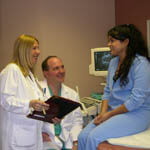
San Antonio (March 23, 2004) – Acne, excessive hair growth, weight gain and infertility – these are some of the devastating side effects of a common female disorder called Polycystic Ovary Syndrome (PCOS). PCOS affects between 3 and 5 percent of women of reproductive age. Although doctors identified the disease in the 1930s, the exact cause remains elusive. Recently doctors have noticed a frightening new trend among PCOS patients. Most have high insulin levels, making them more prone to developing type II diabetes and diabetes-related health problems. The disease could also lead to other serious side effects, including high blood pressure, high cholesterol levels, heart disease and endometrial cancer.
Researchers in the departments of medicine/diabetes, obstetrics and gynecology (ob-gyn), plastic and reconstructive surgery and the Research Imaging Center at The University of Texas Health Science Center at San Antonio are conducting a study to find the cause of PCOS and treatment for its symptoms.
“This is the first time that PCOS has been looked at with such a wide perspective,” said Rachele Berria, M.D., research fellow in the department of medicine/diabetes. Dr. Berria, along with Ralph DeFronzo, M.D., professor and chief of the division of medicine/diabetes, are the principal investigators. They are collaborating with Robert Brzyski, M.D., Ph.D., associate professor of ob-gyn; Scott Lucidi, M.D., assistant instructor of ob-gyn; and Douglas Cromack, M.D., chief of the division of plastic and reconstructive surgery at the Health Science Center. Researchers in the department of molecular medicine at Northwestern University in Chicago are also involved in the project.
“Doctors wonder whether the drug pioglitazone, used to treat patients with type II diabetes, could help alleviate some of the symptoms of PCOS,” Dr. Berria said. “However, more information is needed to determine what exactly causes PCOS, what the mechanisms are through which pioglitazone works, and whether other treatment methods can be used to supplement the positive effects of pioglitazone,” she said.
For women who suffer from PCOS, a cure could mean relief from unwanted hair growth and acne. More importantly, it could mean protection from diabetes, heart disease and endometrial cancer. For women who are infertile, a cure for PCOS could mean the ability to become pregnant in the future.
Health Science Center researchers welcome study participants. Women who have PCOS are encouraged to sign up for the study. Women between the ages of 18 and 40, with a Body Mass Index of 35 or less, who are not on hormone therapy, including birth control, are eligible. Participants will be asked to undergo a series of diabetes tests, sonograms, MRIs, and tissue biopsies, and will be given pioglitazone for a period of four months. Participants will earn $600 after the study is completed.
For more information or to sign up for the study, call Irma Guerra, research coordinator, at (210) 567-4773.

